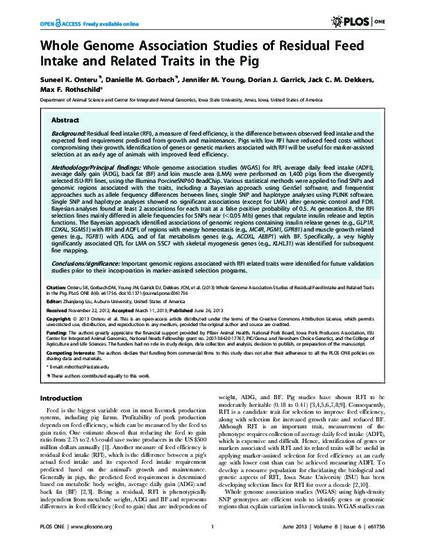
Background
Residual feed intake (RFI), a measure of feed efficiency, is the difference between observed feed intake and the expected feed requirement predicted from growth and maintenance. Pigs with low RFI have reduced feed costs without compromising their growth. Identification of genes or genetic markers associated with RFI will be useful for marker-assisted selection at an early age of animals with improved feed efficiency.
Methodology/Principal findings
Whole genome association studies (WGAS) for RFI, average daily feed intake (ADFI), average daily gain (ADG), back fat (BF) and loin muscle area (LMA) were performed on 1,400 pigs from the divergently selected ISU-RFI lines, using the Illumina PorcineSNP60 BeadChip. Various statistical methods were applied to find SNPs and genomic regions associated with the traits, including a Bayesian approach using GenSel software, and frequentist approaches such as allele frequency differences between lines, single SNP and haplotype analyses using PLINK software. Single SNP and haplotype analyses showed no significant associations (except for LMA) after genomic control and FDR. Bayesian analyses found at least 2 associations for each trait at a false positive probability of 0.5. At generation 8, the RFI selection lines mainly differed in allele frequencies for SNPs near (<0.05 Mb) genes that regulate insulin release and leptin functions. The Bayesian approach identified associations of genomic regions containing insulin release genes (e.g., GLP1R, CDKAL, SGMS1) with RFI and ADFI, of regions with energy homeostasis (e.g., MC4R, PGM1, GPR81) and muscle growth related genes (e.g., TGFB1) with ADG, and of fat metabolism genes (e.g., ACOXL, AEBP1) with BF. Specifically, a very highly significantly associated QTL for LMA on SSC7 with skeletal myogenesis genes (e.g.,KLHL31) was identified for subsequent fine mapping.
Conclusions/significance
Important genomic regions associated with RFI related traits were identified for future validation studies prior to their incorporation in marker-assisted selection programs.
Available at: http://works.bepress.com/max-rothschild/13/

This article is from PLoS ONE 8 (2013): e61756, doi:10.1371/journal.pone.0061756.